5 Questions with the Director of Admissions at Illinois Gies College of Business
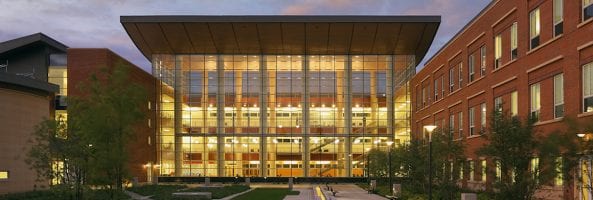
In our latest installment of the MetroMBA “5 Questions” series, we speak with Jennifer Larson, the University of Illinois Director of Recruiting and Admissions of Graduate Programs at the Gies College of Business. Larson talks about the future career of a Gies MBA grad, the hands-on nature of the MBA program, and the many financial aid opportunities for students.
1. What are Gies’ strongest industries and how does the school support students in those industries?
“Our recent graduates have worked for major corporations like Amazon, AT&T, Google, and Bank of America in a number of functional areas, including Consulting, Finance/Accounting, General Management, Information Technology, and Marketing.
Gies Business Career Services boasts a diverse employer base of Fortune 500 companies and other regional organizations across multiple industry sectors including, but not limited to, manufacturing, financial services, consumer products, and consulting. Almost 25 percent of the F500 and more than 40 percent of the F100 recruit from Gies College of Business.
Our students actively engage with global, national and regional employers on-campus and at major MBA consortium events. Illinois founded and participates with nine other Top 50 MBA programs in the Midwest MBA Career Fair, one of the largest regional MBA career fairs.
We offer alumni connections built through the Illinois Business Mentor Program and the Illinois MBA Alumni Association, bringing students and alumni together for an exchange of information on education, professionalism, aspirations, and ideas.
Our MBA students network and engage with alumni and employers for information sessions, workshops, networking events, career connections, and interview preparation. Illinois MBA alumni are counted among those who hold C-suite roles in manufacturing, consulting, financial services, and healthcare in both the public and private sectors.
We hear four predominant reasons why students pursue an MBA:
- to build and expand their professional network,
- to increase salary/earnings potential,
- to create greater future job optionality,
- to accelerate or change career paths.
Whatever the reason, Gies Business Career Services is an invaluable resource for our students from day one.
Career Services provides an integrated suite of career development, coaching, and alumni and employer resources that enable us to assist MBA students in achieving career success. This starts with pre-program groundwork.
Career Management Foundations is the eLearning portal to MBA Career Management in Gies College of Business. This launches your job search the summer before the MBA program commences. You will have the chance to engage in five distinctive career modules that expose you to career planning and active career management processes. These help our students define their goals and develop tools that will enable their professional advancement. Each module contains topic related information, videos, articles, assessments, and key deliverables.
We also provide customized career coaching and consultation for MBA students so they are fully prepared for the job search with a focus on building life-long job seeking skills that will help the student through each career transition. Combine that with being ranked #3 in ROI (BusinessWeek) and being a Top 25 U.S. Business School (Financial Times), there is no question that an MBA from Gies College of Business at Illinois delivers max value during and after your time in the MBA program.”
2. Can you identify the ideal Gies candidate? Characteristics you look for?
“At Illinois, we don’t look for students who want to sit in a classroom for two years. We admit students who are passionate about applying the concepts learned in the classroom, actively participate in and outside of the classroom, and are team oriented. We look beyond test scores. We value candidates who bring a strong sense of community, possess a good understanding of the importance of career outcomes, and can demonstrate excellent interpersonal and communication skills. We appreciate and welcome diverse personal and professional backgrounds beyond business.”
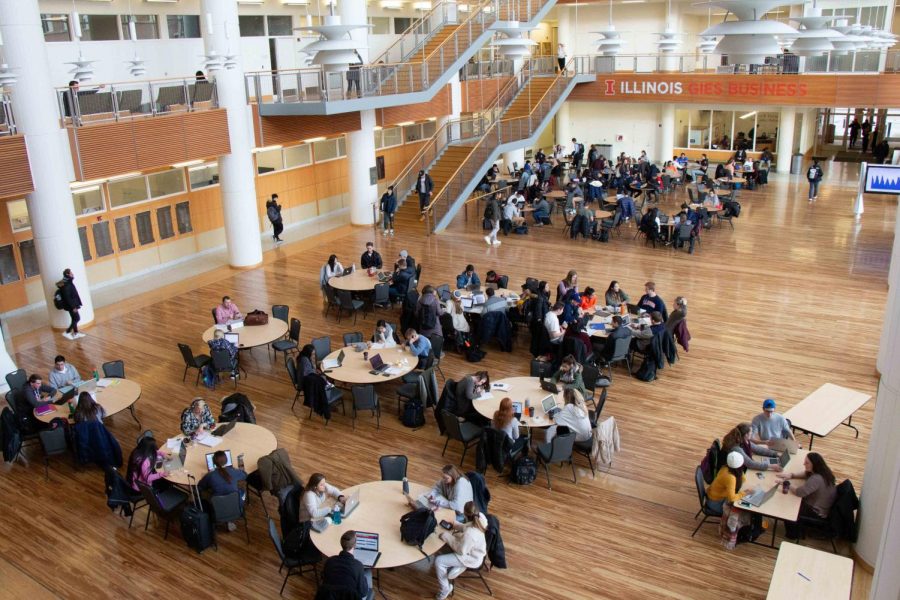
“, “At Illinois, we don’t look for students who want to sit in a classroom for two years. We admit students who are passionate about applying the concepts learned in the classroom, actively participate in and outside of the classroom, and are team oriented,” Larson says.
3. If there was one feature of the MBA program you could highlight, what would it be?
“The MBA program at Gies College of Business is one of the most hands-on MBA programs in the country.
Action Learning at Gies is more than a course or a program; it’s ingrained in our culture. Action Learning is integrated throughout our undergraduate and graduate programs. Because our students get hands-on experience during school, they graduate more prepared for the real-world, to add value from day one, and to succeed in their careers.
Action Learning projects are a critical part of the students’ education. We work with clients who invest in developing our students. When a client is engaged and committed, students reciprocate with enthusiasm and dedication to the project. Through our Action Learning programs, students have a better story to tell recruiters, improve their ability to work as a team, and enhance their ability to solve complex problems.”
4. What kinds of financial aid are available to MBA students?
“All candidates admitted to the MBA program in Gies College of Business at Illinois are automatically considered for our merit-based Dean’s Scholarships with no separate scholarship application necessary. 85 percent of students admitted to the MBA program receive a scholarship offer from our diverse portfolio of awards. We also want our students back! The Illinois x 2 Scholarship offers a 50 percent tuition reduction for full-time MBA students who are University of Illinois alumni and meet the eligibility requirements. Find all the scholarships here.
The MBA program at Gies is dedicated to training an inclusive cohort of future leaders in a diverse, global setting. In addition to our traditional merit-based scholarships, we allocate eight full-tuition scholarships annually, for graduates of historically black colleges and universities. Along with submitting a standard MBA application, applicants for these eight scholarships must have a competitive GMAT score (or equivalent GRE), at least two years of work experience, and a minimum GPA of 3.5.
Gies College of Business is committed to educating and directing talented women toward leadership roles in business. Gies College of Business is a Forté sponsor school dedicated to having a diverse group of Forté MBA Fellows, which is an honor given to select female MBA students at participating business schools. Both domestic and international women may be nominated as Fellows; each receives a generous scholarship from the MBA program at Gies College of Business.”
5. What underrated area/activity in Champaign – Urbana should every student do?
“Champaign-Urbana has a robust arts, culture, and music scene. Here, urban engages rural for an unparalleled ‘college-town’ experience that offers access to several renowned museums, and a thriving arts and culture community. In large part because of the University of Illinois’ diverse population, C-U has a strong foodie scene with a wide variety of restaurants and cuisines from all over the world. According to readers of Midwest Living magazine, the metro area of Champaign-Urbana is the best midwest food town.
For those interested in learning more about the full-time MBA program at Illinois Gies College of Business, head over to the school’s official website.
Michigan Ross’ Associate Admissions Director Answers 5 Questions
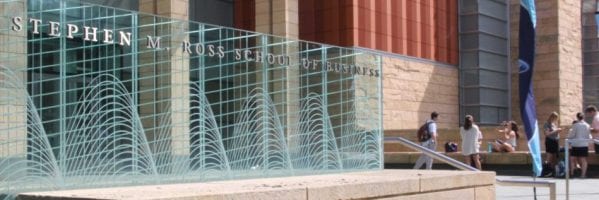
In our latest installment of the MetroMBA “5 Questions” series, we speak with Anne Schoen, the Associate Admissions Director of Part-Time MBA Programs at the University of Michigan Ross School of Business. Schoen talks about the newest Ross MBA program, changing the Online MBA game, and what this means for the future of business schools.
1. Why do you believe the Ross School of Business elected to start offering an online MBA now?
“More and more companies are operating on a global scale, and professionals need to be able to effectively interact with and manage teams across those global boundaries. Managing a project with team members in four different locations presents a different challenge than if those team members all work in the same building. We see educational value in preparing our students to work and engage through primarily virtual channels. Professionals who possess this unique skill set can differentiate themselves in the career marketplace.
In addition, technology (connectivity, learning platforms, virtual tools, etc.) today is at a place where we feel comfortable that an online experience can rival what we offer in our on-campus programs.
Finally, we are answering a demand in the market. For years, we have heard prospective students tell us they really wanted a top-tier MBA experience but require more flexibility in course scheduling and graduation pace. There are amazing working professionals out there desiring a premier educational experience whom this program can serve.”
2. What do you believe are the integral differences between this online program and others currently available at other schools?
“One of the signature features of a Michigan Ross MBA is an emphasis on action-based learning, and our Part-Time MBA: Online is no exception. Our three required on-campus residential experiences and required Multidisciplinary Action Project (MAP) course set us apart from other online programs. Our students will enjoy the flexibility of an online program, but also will benefit from engaging in-person with faculty and fellow students during these fully immersive experiential learning projects. These experiences will require that students take the theories they learn in class and apply them to real-world business scenarios. We also will offer our online students full access to our Career Development Office resources, including assistance with on-campus and off-campus recruiting, and individualized career development planning.”
3. What do you believe other online programs may be missing?
“We have been very intentional in the development of the online MBA program to ensure that students in this program have the same access and a similar experience to those students enrolled in our on-campus MBA programs. We are holding applicants to the same rigorous admissions standards, keeping the class size fairly small, providing them with the resources needed to advance their careers or make a career switch, giving them a connection to campus and the vast Ross network through residencies, and offering lifelong learning opportunities through our AlumniAdvantage program.”

The all-new Part-Time MBA: Online at the University of Michigan Ross School of Business offers students a flexible, online schedule, coupled with the business school’s hands-on curriculum approach, featuring on-campus residencies and the Multidisciplinary Action Project (MAP) course.
4. If someone couldn’t decide between Ross’ part-time online MBA and the other options at the school, what factors do you think should push them to the online program?
“I think the two major factors students should consider when choosing between program options at Ross are geography and flexibility. Our Part-Time MBA: Evening program, while flexible in nature, is really only an option for people living in the region because class meetings take place primarily on weeknights. Our Part-Time MBA: Weekend program attracts student from across the country looking for a lockstep, cohort-based program. The Part-Time MBA: Online is flexible—students’ progress at their own pace—while also being open to people across the U.S. I always tell students to select the MBA program based on what format is going to work best for their own busy working-professional and personal schedules. The great thing is that we have many MBA formats that feature the same rigorous Ross curriculum. Regardless of schedule, one of our program options will likely meet your needs.”
5. Is this a sign for more online programs to come for the Ross School of Business?
“That is an excellent question. Here at Ross, we are always looking at new ways to innovate our programs and ensure that our elite learners have an exceptional educational experience. We will continue to evaluate the changing MBA landscape and needs in higher education and our offerings. Today, we are focusing our energy and resources on successfully launching the Part Time MBA: Online program and recruiting our first class of students.”
For those interested in learning more about the Ross Part-Time: Online program, head over to the school’s official website.
5 Questions with the Senior Associate Dean of MBA Programs at BU Questrom

In our latest installment of the MetroMBA “5 Questions” series, we speak with Barbara Bickart, the Senior Associate Dean of MBA Programs at Boston University’s Questrom School of Business. Bickart talks about the qualities MBA candidates possess, unique opportunities for MBA students, and things to do in Boston.
1. Why should an MBA candidate be excited to apply to Questrom?
“I believe three main factors make our program unique.
First, Questrom has a strategic focus on three sectors that we have identified as drivers of growth in our economy—digital technology, health, and social impact. We have developed unique program offerings as well as vibrant communities around these three sectors, and many of our students participate in one of these programs.
Second, our program is designed so that students can obtain a deep base of functional knowledge and key skills, and start their elective courses in the first year. Our first year is divided into four, seven-week modules. In the first three modules, students take three classes and complete an integrated experiential project. For example, in Mod 3, students take Strategy, Information Systems, and Organizational Behavior while working on a client-based project that addresses strategic issues in one of our three sectors. Through this process, students learn to view and solve problems from a multi-disciplinary perspective. Students can start taking elective courses during Mod 4.
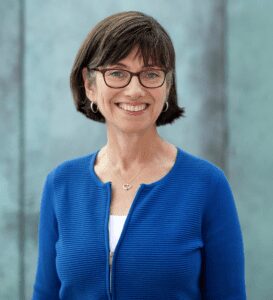
Barbara Bickart is an Associate Professor of Marketing and Senior Associate Dean for MBA Programs.
Finally, Boston is a great place for students studying business, with a vibrant culture around innovation and technology. Our project-based learning draws on the Boston eco-system, and many of our students end up working in Boston or the immediate area.”
2. What type of MBA candidate is the best fit for Questrom?
“Our students come from a variety of backgrounds and experiences. In addition to being smart, intellectually curious, and engaged, the two traits that I would say best characterize our students are that (a) they care about community and the impact of their work on society and (b) they are agile and creative—they are flexible in how they think about and solve problems and look outside the box for solutions.”
3. How does Questrom stay on the cutting edge of MBA education? Is there a unique feature you can highlight?
“We are constantly evaluating and updating our curriculum, with a particular focus on adding more experiential learning opportunities in our courses and co-curricular experiences. Our faculty’s research often drives our elective courses. For example, one of our most popular elective courses is Platform Strategy. This course was developed by Professor Marshall Van Alstyne and is based on his book Platform Revolution: How Networked Markets are Transforming the Economy and How to Make the Work for You (2016, W.W. Norton and Co). In this course, student teams work on consulting projects for major platform-based companies. Past projects have been sponsored by Airbnb, Allstate, Capgemini, eBay, edX, Jawbone, Haier, Huawei, Mahindra, Pearson, PGA, PTC, Siemens, SAP, startups, and many others.”
4. What unique opportunities outside of the MBA curriculum make Questrom stand out?
“Our student community is active and engaged—there is always something going on here at Questrom. Students take advantage of the Boston ecosystem—attending networking events and conferences, for example, in health and life sciences. Questrom students are also involved Innovate@BU, which is a BU-wide initiative supporting student-led innovation and entrepreneurial activities. Students take advantage of the Build Lab IDG Capital Student Innovation Center, which is an on-campus co-working space for collaboration and new ventures. The Questrom School of Business Internship Fund provides financial support our students interested in exploring internships at not-for-profits. Finally, we offer a number to global learning opportunities, both in our curriculum and via student-run trips. Groups travel to Paris to study luxury marketing, South Africa to study social impact, Israel to study entrepreneurship, Vietnam to study manufacturing, and Silicon Valley to learn more about digital technology.”

“The views of Cambridge and Boston are amazing. I particularly love walking along the Charles during the Head of the Charles rowing races in October,” Bickart says.
5. What’s your favorite activity in Boston? Why?
“My favorite activity in Boston is to walk along paths on the Charles River. From my office, it takes just a few minutes to get to this path. The views of Cambridge and Boston are amazing. I particularly love walking along the Charles during the Head of the Charles rowing races in October. The races are exciting and fun to watch, and there is a lot of energy in the crowd.”
Virginia Tech’s Director of MBA Programs Answers 5 Questions
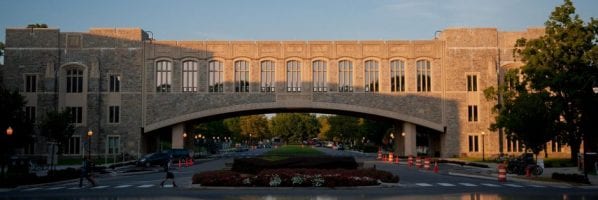
In our latest installment of the MetroMBA “5 Questions” series, we speak with Dana Hansson, the Director of MBA Programs at Virginia Tech’s Pamplin College of Business. Hansson talks about the school’s culture, the faculty, and the networking opportunities available for students.
How would you describe the culture of Virginia Tech Pamplin?
“We are a community of professionals seeking greater opportunities through learning and networking. Our faculty scholars love to teach graduate students and build relationships,” says Hansson. “Our student body is engaged, curious and supportive. Our MBA program is flexible, allowing you to choose the pace, which meets your lifestyle and select courses to expand your horizons.”
According to Dean Robert Sumichrast, “Pamplin has large and expanding programs in Northern Virginia, including our MBA and other planned programs that take advantage of the business and government environment of the Washington metro area.”
What type of student is the best fit for Pamplin’s MBA program (career goals, experience, interests, etc)?
“Pamplin MBA students have professional experience and are ready to take the step in their career, be that seeking a promotion at their employer, shifting from one sector to another or making a pivot to something new such as launching a business concept,” explains Hansson. “Our students are service oriented, embracing the ‘Ut Prosim: That I May Serve at Virginia Tech,’ with many having military service. They enjoy the large and active alumni base, feeling a part of something dynamic.”
Speaking of military service, MBA students with a military background looking to transition to a civilian career or move up the ranks will find lots of support at Virginia Tech. A few of the benefits provided include:
- Military application fee waiver.
- There are Student Affairs specialists available to liaison with the VA on your behalf.
- Financial aid is available including Post 9/11 help.
- Alumni and current students can speak with you about their experience.
If there was just one piece of advice you could give to an MBA applicant considering Pamplin, what would it be?
“Do your due diligence as you explore programs; learn the basics of the program, talk to current students, alumni of the program and faculty,” Hansson encourages. “You will be making a large investment in time and money, as well that from your significant others and employers, so make sure you have chosen the best program to meet your needs.”

Dana Hansson, the Director of MBA Programs.
To help you with your research, Pamplin regularly hosts information sessions all about their MBA programs.
- March 13: Evening MBA Information Session (Northern Virginia Center)
- March 14: All MBA Programs Information Session (online)
- April 9: Evening MBA Information Session (Northern Virginia Center)
- April 17: All MBA Programs Information Session (online)
How accessible are Pamplin professors? Can you give an example?
“MBA program faculty reside in Northern Virginia and have weekly office hours, and are available to meet you at your convenience,” Hansson says. “Emails work well too.”
In terms of faculty and staff, Pamplin is a very small college. This makes it a rather intimate experience. In addition, the school recently appointed “some of the most promising new and accomplished faculty from around the world,” says Dean Sumichrast. He admitted that this was an “intentional change” to increase diversity, raise expectations, and improve faculty research and teaching.
In particular, the school has made prominent strides toward diversity. Among faculty, the percentage of underrepresented minorities is now 16 percent from 0 percent four years ago.
Sumichrast also states, in the same speech, that the college is a very open and friendly environment, “An important part of community is becoming more welcoming and inclusive of everyone, and we have become more welcoming,” he says.
What club would you recommend for a student to check out and why?
“As our MBA program is a part-time offering, our students are busy with life and work,” Hansson explains. “Clubs are not available. However, we offer several networking and alumni mentoring opportunities each semester.”
In regards to networking, the MBA Career Network, launched in 2014, is an opportunity to match MBA students with alumni volunteers. And with a vast Hokie Nation to choose from, there are many mentoring opportunities across Northern Virginia, Richmond, and Roanoke.
As for opportunities beyond clubs, Evening MBA students can choose to participate in a study abroad course to gain international experience. This two-week study abroad portion, allows students to visit several multinational and international corporations, local businesses, and cultural venues.
5 Questions With Pasquale Quintero, MBA Director at the TCNJ School of Business

In our latest installment of the MetroMBA “5 Questions” series, we speak with Pasquale Quintero, MBA Director at the at the TCNJ School of Business. Quintero talks about the school’s new MBA program, the “T-Style” curriculum, and the best food you can get in Trenton, NJ.
Why do you believe TCNJ introduced its new MBA program?
“The College of New Jersey School of Business is delivering a contemporary, relevant, highly competitive MBA education that provides both near-term and long-term benefits to early career professionals. Employers want employees with strong skill sets in a specific area and a broad understanding of business on which they can build. Employees want to build successful and stable careers. Therefore, the School of Business determined students need immediate applicable specialized skills, hence the creation of the ‘T-Style’ curriculum.”
What can you expect for the first year of the program?
“The ‘T-Style’ offers students the ability to specialize in Data Analytics, Finance, or Strategy, Innovation and Leadership during their first year of study. In the second year, students will round out their education by taking courses designed to equip them with the tools to be effective managers. This approach provides the student with depth, breadth, and an early return on investment with a graduate certificate after their first year of study.”

“Third, the program is offered in a hybrid format (online and face-to-face), which will allow students to enroll in the MBA program without disrupting their personal and professional obligations,” Pasquale notes.
What are the differences between the TCNJ MBA and other business schools?
• “First, our unique ‘T-Style’ curriculum offers students the benefit of deep dive learning in a specialization in Data Analytics, Finance or Strategy, Innovation and Leadership during their first year of study. Students will gain enhanced skills to apply in their day-to-day decision-making.
• Second, the program will have a business practitioner associated with each course. The faculty will use the practitioner to help reinforce and expand upon the application of MBA concepts in practice.
• Third, the program is offered in a hybrid format (online and face-to-face), which will allow students to enroll in the MBA program without disrupting their personal and professional obligations.
• Students meet in class for eight hours on Saturdays, six times in the fall and spring, plus four times in the summer. When not meeting face-to-face, students will complete their coursework online. Winter courses will be offered 100 percent online.
• Finally, the program is price competitively.”
What is one major advantage TCNJ provides in the new program?
“The innovative ‘T-Style’ curriculum as it is taking a different approach to graduate management education. After just one year students can demonstrate real progress in a specialty area after just seven courses.”
Where can I get some good food in Trenton?
“On campus there are some great restaurants such as Mexican Mariachi, Piccolo Pronto, and Yummy Asian Cuisine. I’ve heard good things about Cafe ’72 near campus, and there are plenty of great restaurants to choose from in downtown Princeton.”
5 Questions With Imran Kanga, Rotman’s MBA Director of Admissions

In our latest installment of the MetroMBA “5 Questions” series, we speak with Imran Kanga, Director of Recruitment & Admissions of the full-time MBA program at the Toronto Rotman School of Management. Kanga discusses what students should know before applying and the culture of the program.
What type of MBA student flourishes at Rotman?

Imran Kanga, Director of Recruitment & Admissions of the full-time MBA program.
“Students who flourish in the Rotman full-time MBA program are highly driven and motivated individuals who have demonstrated leadership potential and academic excellence in their prior work and education. Our students also demonstrate excellent communication and interpersonal skills and thrive in a team environment, which not only is a significant part of the program but also sets them up for success in the workplace after graduation.”
What should prospective students know about the Rotman MBA program before they apply/start?
“The Rotman MBA program is a big commitment, both in terms of time and money. I would encourage prospective students, before they apply or start the program, to thoroughly research the program, the university, the city, and the career opportunities that potentially await them. It is important for them to speak to faculty, alumni, our career coaches, current students, and also the admissions team to understand what the requirements are and what they can expect from the program.
The FT MBA program is extremely rigorous and demanding, but it is also a very rewarding experience, and students need to be prepared before starting the program.”
What makes Rotman stand out amidst other Canadian MBA programs?
“There are so many factors that distinguish the Rotman MBA from other Canadian programs. To focus on a few…
- Being part of Canada’s largest and top-ranked University, Rotman MBA students enjoy the benefits of not only all the resources that the business school offers but also the University of Toronto as a whole. This includes being part of an extended global alumni network and a strong brand that is globally recognized.
- Our location in the heart of the largest city in Canada gives our students unfettered access to the largest business network in the country.
- Rotman also has some unique labs such as the Creative Destruction Lab, which supports startups in technology and disruptive innovation to scale and also gives our students the opportunity to work with these companies. Our one of a kind Self-Development Lab uses advanced technology and analytics to help students improve their soft skills such as communication, negotiation and presentation skills.”
How would you describe the culture of Toronto Rotman?
“The culture at Rotman is very much student success driven. Faculty, staff, alumni, and various other stakeholders work closely with students throughout their MBA journey to ensure that they are set up for success both during and after the MBA program.
At Rotman, we are also extremely committed to diversity and inclusion. Our students are extremely diverse, coming from all over the world and have different education and work backgrounds, which fosters a culture of knowledge sharing, support, and collaboration.
Our Dean Tiff Macklem is focused on continuous improvement, innovation, thought leadership, and research excellence, which is also central to Rotman’s culture.”
Where is your favorite place to visit in Toronto? Why?
“As a foodie, my favorite area of Toronto is the downtown core, which has a wide variety of restaurants and cuisines from all over the world, owing to the city’s incredibly diverse population.”
